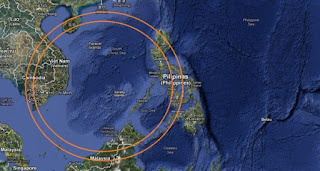The Moral Option in the West Philippine Sea
by Christopher Ryan Maboloc
The
West Philippine Sea enunciates the very difficult situation of the Philippines in
the midst of China’s economic and military might in our multipolar world. But
our option must be moral, not just political. The Permanent Court of
Arbitration in The Hague may have truly dealt a death blow to China’s expansionist
claims in the disputed territory, but what is apparent still in the aggressive
stance of China is its onerous plan to control the seas and the airspace above
it. Chinese political posturing in those waters, as manifested by its
calculated readiness to throw its weight on a hapless neighbor, means that China
wants to send out the message that it wants to be known as a dominant player in
the new global order.
The United States has spread itself too thin, fighting wars in Iraq and Afghanistan that has cost its national treasury more than a trillion dollars in the last decade. Russia’s own ironman, Vladimir Putin, has remained a formidable adversary, and the unpredictable Kim Jong-Un has steadily been a constant headache to Washington think-tanks. Right now, Europe is under attack, as it now confronts home grown radicalization and the infiltration of its soil by extremists, with the unabated exodus of millions of refugees who are now at its doorsteps. Locally, the Philippines can only muster a little resistance against its giant neighbor, with the Armed Forces of the Philippines promising to consolidate its men and equipment, which is no more than an emphasis on the importance of maintaining a moral high ground. The big problem now is that China does not want to recognize the diplomatic overture of the Duterte administration if it does not set aside the decision of the Arbitral Court, which has grounded its judgment in the United Nations Convention on the Laws of the Seas (UNCLOS), of which China is a signatory.
Meanwhile, the Enhanced Defense
Cooperation Agreement with the United States, a mutual defense treaty which
will allow US Forces to land on Philippine soil, has been met with scorn by
some quarters, expressing concern that such is tantamount to American interference. The US is facing a dilemma, according to analysts. If it does not express its strong
opposition to Chinese bullying, then the only remaining superpower in the world
might be perceived as weak. But if it chooses to face Chinese aggression up
front, then it risks heightening the tension in the Pacific. Indeed, realpolitik
in its highest form may be at work here, considering that the US cannot
actually abandon its huge economic interests in China in favor of its small
ally in the Pacific. The Philippines must act with caution. The meetings
between Henry Kissinger and Mao Tse Tung in the past should remind us how the
fate of the world, which hung in the balance then due to the Cold War, was
decided over a cup of tea.
Indeed, the above issue has raised a
cacophony of divergent voices: global diplomacy versus realpolitik, nationalism
against appeasement, and the danger of a new global order. Some argue that our
courage and unwavering commitment to national sovereignty and freedom means
that we have to respond in the strongest possible way. There are those who have
called upon the country to modernize its military, and in that sense, determine
its destiny. But I think such is the wrong strategy. You cannot buy military
hardware, drones or spy planes, fighter jets with multi-role capability, or
dream of creating a missile defense system around the archipelago while 25% of
the Philippine population is hungry. While patriotism is a noble virtue, the
right thing to do is at this very moment in our history is to strengthen our moral
resolve to develop our economy by spending on infrastructures and improving the
basic services rendered by our institutions. The first order of battle should
be to equitably distribute national wealth and create more jobs to uplift the
lives of millions.
While it is true that the US can
immediately dispatch USS Dwight Eisenhower should conflict arise in the West
Philippine Sea, know that any type of violence will devastate not New York but our
own home soil. We must cease becoming a mere pawn in any proxy war that can go
nuclear. Diplomacy, in this regard, remains to be the only option for the
country. We have to express a strong moral stand in defense of the integrity of
our national territory, but at this moment of uncertainty, the primary concern
that we must embrace as a people is to maintain the security in the region by
easing tensions. We have won a moral victory at the Arbitral Court, but we
cannot also afford any type of conflict that might arise in the area because
going to war is not a moral option if we fundamentally desire the greater good
of our people.



